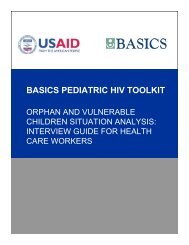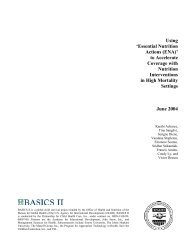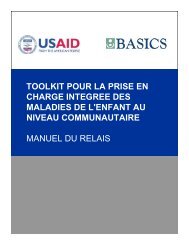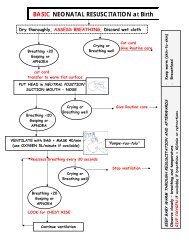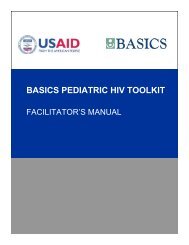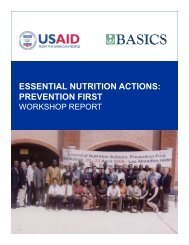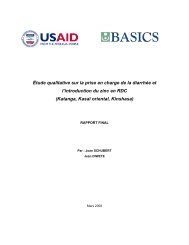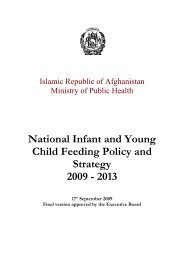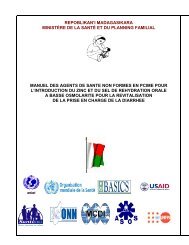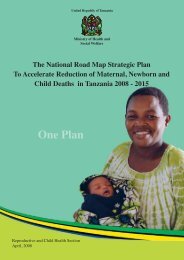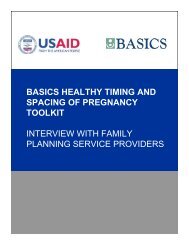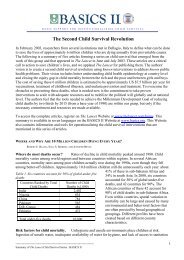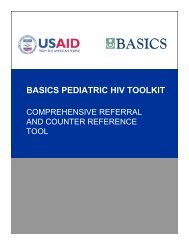Integrated Maternal and Newborn Care Basic Skills Course ...
Integrated Maternal and Newborn Care Basic Skills Course ...
Integrated Maternal and Newborn Care Basic Skills Course ...
You also want an ePaper? Increase the reach of your titles
YUMPU automatically turns print PDFs into web optimized ePapers that Google loves.
Reference Manual<br />
CHAPTER 13: Treatment of Infections<br />
in the <strong>Newborn</strong><br />
Infections are the major cause of death during the neonatal period accounting for 35 percent of<br />
deaths in the first four weeks of life. <strong>Newborn</strong> infants, especially low birth weight infants, are at a<br />
particularly high risk for infection because of their underdeveloped immune processes <strong>and</strong> their<br />
increased exposure to germs since, being totally dependent on the mother, family members <strong>and</strong><br />
other care providers, they come in frequent physical contact with a number of persons.<br />
<strong>Newborn</strong> babies are also susceptible to germs that do not readily cause major infections in<br />
normal older infants. Common organisms include E. coli, Klebsiella sps, Staphylococcus sps,<br />
<strong>and</strong> group B streptococci. Organisms vary by region, over time, <strong>and</strong> due to long-term use of<br />
antibiotics.<br />
In the newborn, minor/localized infections may spread easily. Rapid progression of disease is<br />
very common <strong>and</strong> it may become life threatening. This necessitates early identification <strong>and</strong><br />
prompt treatment with antibiotics. In the later stages babies not only stop sucking but are also<br />
unable to accept <strong>and</strong> retain feeds, thereby necessitating intravenous fluids <strong>and</strong> antibiotics that<br />
are feasible only at higher level health centers. Hence, early identification <strong>and</strong> prompt treatment<br />
are essential.<br />
Socio-cultural factors also influence the impact of infections. Mothers <strong>and</strong> babies are confined to<br />
their homes, <strong>and</strong> even those who have facility births go home early <strong>and</strong> then continue to remain<br />
there. Danger signs, even if identified, are often attributed to nonmedical reasons, <strong>and</strong><br />
appropriate care is not sought early so that when babies reach facilities, the disease has<br />
advanced considerably. Many families, moreover, do not have adequate faith in the care<br />
provided at facilities. Women are frequently not empowered, <strong>and</strong> major decisions in the family<br />
are made by the men. While paternal gr<strong>and</strong>mothers may have some influence, mothers often<br />
have very little influence when medical decisions are being made. Some families are also<br />
h<strong>and</strong>icapped by little or no access to services, either because of distance or due to lack of<br />
finances.<br />
Pre-service education of doctors, nurses, <strong>and</strong> midwives related to newborn care is often<br />
inadequate <strong>and</strong> inappropriate, so that basic health workers do not have the competence to<br />
manage newborn infants, especially sick babies. They also do not have the support of the<br />
necessary equipment, supplies, <strong>and</strong> drugs of appropriate sizes <strong>and</strong> strengths. Their interaction<br />
with families also presents challenges in some cases due to lack of courtesy. They often do not<br />
have the time nor the skills to establish rapport <strong>and</strong> to counsel mothers <strong>and</strong> families effectively.<br />
THE TIMING OF INFECTIONS<br />
Some infections are early onset <strong>and</strong> some are late onset. Early onset infections (from delivery<br />
through day 3) are usually acquired from maternal risk factors <strong>and</strong> during delivery. These<br />
factors include:<br />
<strong>Integrated</strong> maternal <strong>and</strong> newborn care<br />
<strong>Basic</strong> skills course<br />
149



